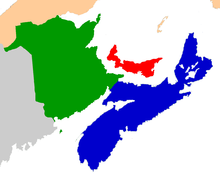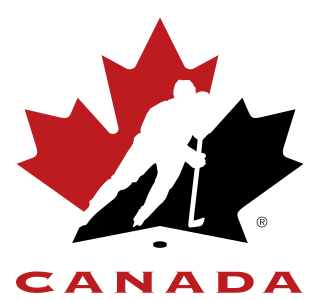
Hockey Canada is the national governing body of ice hockey and ice sledge hockey in Canada. It is a member of the International Ice Hockey Federation and controls the majority of organized ice hockey in Canada. There are some notable exceptions, such as the Canadian Hockey League, U Sports, and Canada's professional hockey clubs; the former two are partnered with Hockey Canada but are not member organizations. Hockey Canada is based in Calgary, with a secondary office in Ottawa and regional centres in Toronto, Winnipeg and Montreal.
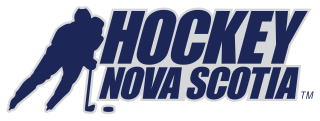
Hockey Nova Scotia is the governing body of all ice hockey in Nova Scotia, Canada. Hockey Nova Scotia is a branch of Hockey Canada.

Donald Stewart Johnson was a Canadian sports executive. He was elected president of the Newfoundland Amateur Hockey Association (NAHA) in 1966, sought to expand minor ice hockey in Newfoundland and negotiated for the NAHA to become a member of the Canadian Amateur Hockey Association (CAHA). He was elected president of the CAHA in 1975, resolved internal disagreement over the jurisdiction of junior ice hockey, avoided the withdrawal of the Western Canada Hockey League and sought a new professional-amateur agreement with the National Hockey League and World Hockey Association. He was part of negotiations to end the Canada men's national ice hockey team hiatus from the Ice Hockey World Championships and the Olympic Games, in exchange for International Ice Hockey Federation approval of the 1976 Canada Cup. He established a long-term sponsorship to improve the National Coaching Certification Program, twice visited China with a Canadian amateur team for instructional tours and arranged an exchange for Chinese players and coaches to attend training camps in Canada. He was chairman of the 1978 World Junior Ice Hockey Championships as the CAHA past-president, and was posthumously credited by Hockey Canada for playing an important role in Canada's return to international competitions and improving Canada's hockey reputation.

Claude Copeland Robinson was a Canadian ice hockey and sports executive. After winning an intermediate-level championship as captain of the Winnipeg Victorias in 1905, he served as secretary-treasurer and as vice-president of the Victorias. He coached the Victorias to a Manitoba Hockey League championship in 1909, and felt that his team could have competed for the newly established Allan Cup, despite that challenges from senior ice hockey teams were accepted only from Eastern Canada at the time. The Victorias won the Allan Cup by default in 1911, when the Toronto St. Michael's Majors refused to play, then successfully defended four challenges for the trophy.

George Samuel Dudley was a Canadian ice hockey administrator. He joined the Ontario Hockey Association (OHA) executive in 1928, served as its president from 1934 to 1936, and as its treasurer from 1936 to 1960. He was elected to Canadian Amateur Hockey Association (CAHA) executive in 1936, served as its president from 1940 to 1942, as its secretary from 1945 to 1947, and as its secretary-manager from 1947 to 1960. He was secretary of the International Ice Hockey Association from 1945 to 1947, and was later vice-president of the International Ice Hockey Federation (IIHF) from 1957 to 1960. He was expected to become the next president of the IIHF before his death. He graduated from Osgoode Hall Law School in 1917 then practiced law for 43 years as the town solicitor for Midland, Ontario.

James Archibald Dunn was a Canadian sports executive involved in ice hockey, baseball, fastpitch softball, athletics, football and curling. He was president of the Canadian Amateur Hockey Association (CAHA) from 1955 to 1957, after five years as vice-president. He assumed control of the CAHA when it failed to produce a Canada men's national team which would win the Ice Hockey World Championships, and recommended forming a national all-star team based on the nucleus of the reigning Allan Cup champion. Wanting to create goodwill in international hockey, accompanied the Kenora Thistles on an exhibition tour of Japan, then arranged for the Japan men's national team to tour Canada. In junior ice hockey, he was opposed mass transfers of players to the stronger teams sponsored by the National Hockey League, and supported weaker provincial champions to have additional players during the Memorial Cup playoffs. He later represented the CAHA as a member of the Hockey Hall of Fame selection committee for 15 years.
The Maritime Major Hockey League was a semi-professional men's senior ice hockey league which operated for four seasons from 1950 to 1954, in New Brunswick and Nova Scotia. The league competed for the Alexander Cup as part of the Major Series operated by the Canadian Amateur Hockey Association (CAHA). Agreements were made with the National Hockey League to limit the number of players that could be drafted from the Major Series and the corresponding draft payment made to teams in the Maritime Major Hockey League.
The Wheat City Hockey Club was an early amateur ice hockey club in Brandon, Manitoba. The club fielded senior-level, junior and intermediate teams from 1898. The club fielded teams in the Manitoba & Northwestern Hockey Association, followed by the Manitoba Hockey Association, the Manitoba Professional Hockey League (MPHL) and the early Manitoba Hockey League.
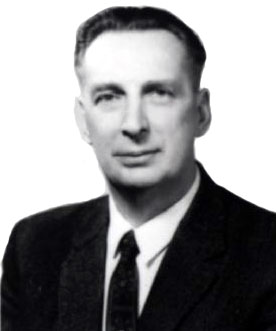
Hanson Taylor Dowell was a Canadian ice hockey administrator and politician. He served as president of the Canadian Amateur Hockey Association from 1945 to 1947, and was the first person from the Maritimes to serve on the national executive. He sought to have the Canadian definition of amateur recognized at the World Championships and the Olympic Games for the benefit of Canada's national team, and negotiated the merger of the International Ice Hockey Association into the Ligue Internationale de Hockey sur Glace. He served as president of the Maritime Amateur Hockey Association from 1936 to 1940, and later as treasurer of the Maritimes and the Nova Scotia Hockey Associations for a combined 30 years.
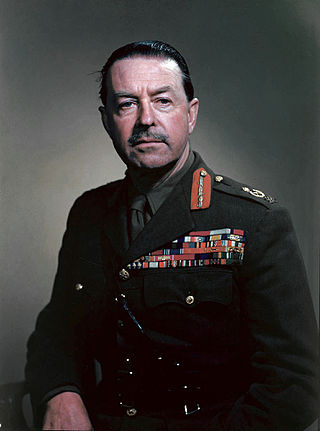
The Alexander Cup was the championship trophy for the Major Series of senior ice hockey in the Canadian Amateur Hockey Association from 1950 to 1954. The trophy was presented by its namesake, the Viscount Alexander as the 17th Governor General of Canada.

The Halifax Wolverines were an amateur men's senior ice hockey team based in Halifax, Nova Scotia. The team won the 1935 Allan Cup, and were nominated to represent Canada in ice hockey at the 1936 Winter Olympics but disbanded before playing in the Olympics.
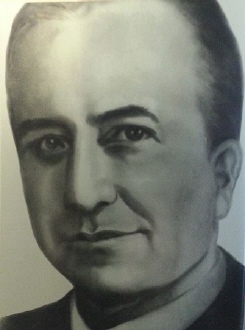
Cecil Charles Duncan was a Canadian ice hockey administrator. He served as president of the Canadian Amateur Hockey Association (CAHA) from 1936 to 1938 and led reforms towards semi-professionalism in ice hockey in Canada. He served as chairman of the CAHA committee which proposed a new definition of amateur to eliminate what it called "shamateurism", in the wake of Canada's struggles in ice hockey at the 1936 Winter Olympics. He negotiated a series of agreements to protect the CAHA's interests, and to develop relationships with all other areas of the world where hockey was played. The agreements allowed the CAHA to become independent of the Amateur Athletic Union of Canada which wanted to keep the old definition of pure amateurism. Duncan's reforms also returned the CAHA to affluence after four years of deficits during the Great Depression and increased player registrations in Canada.

Edward Albert Gilroy was a Canadian ice hockey administrator. He served as president of the Manitoba Amateur Hockey Association (MAHA) from 1927 to 1934, and the Canadian Amateur Hockey Association (CAHA) from 1934 to 1936. In Manitoba, he sought to expand senior ice hockey and establish co-operation between teams and owners of the Winnipeg Amphitheatre on schedules and reducing travel costs. He wanted all players aged 21 and younger to remain in junior ice hockey and began to negotiate with professional teams to refrain from signing them to contracts. His seven years as leader of the MAHA was the longest tenure for a president at the time, during which he oversaw continued growth of the association and improvement of finances.

William Franklin Taylor was a Canadian ice hockey administrator. He was the founding president of both the Canadian Amateur Hockey Association (CAHA) and the Manitoba Amateur Hockey Association in 1914, and also served as president of the Winnipeg Amateur Hockey League. He sought for the Allan Cup to be symbollic of the amateur hockey championship of Canada, and to establish a national authority to oversee competition for the trophy. He allied the CAHA with the Amateur Athletic Union of Canada against professionalism and to promote amateur sport and expand hockey in Canada. He supported a desire by the players to govern their own affairs, to standardize ice hockey rules and ice hockey rink dimensions, and recognition of the authority and judgment of on-ice officials. Taylor assisted with patriotic fundraising to contribute to the World War I effort in Canada, and served the community in Winnipeg as a leading member of the Elks and the Shriners. He sat on the board of governors for The Children's Hospital of Winnipeg and the local Children's Aid Society, and was posthumously inducted into the Manitoba Hockey Hall of Fame in 1992.
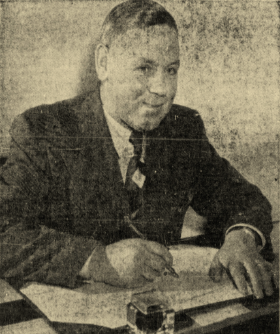
Douglas George Grimston was a Canadian ice hockey administrator who served as president of the Canadian Amateur Hockey Association (CAHA) from 1950 to 1952. He oversaw the establishment of the Major Series for the Alexander Cup and implemented a new deal for player contracts in senior ice hockey, in response to the Allan Cup championship being dominated by a small group of teams who sought to protect themselves from professional leagues recruiting their players. He opposed the National Hockey League wanting its junior ice hockey prospect players on stronger teams, which led to limits on the transfer of players to keep balanced competition for the Memorial Cup. After the 1952 Winter Olympics where the Canada men's national ice hockey team won the gold medal, Grimston recommended withdrawal from Olympic hockey since European nations would never agree to ice hockey rules which allowed physical play. Grimston later accused International Ice Hockey Federation vice-president Bunny Ahearne of financially exploiting of the Edmonton Mercurys on a European tour, which led to a physical altercation between them.
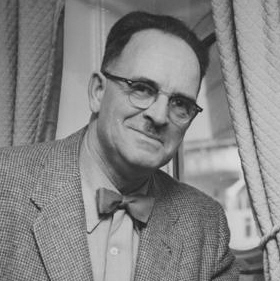
William Bryden George, also known as Baldy George, was a Canadian sports administrator and agriculturalist. He was president of the Canadian Amateur Hockey Association from 1952 to 1955, when Canada debated whether it would withdraw from the Ice Hockey World Championships and the Olympic Games. At issue was the perceived financial exploitation of the Canada men's national ice hockey team and abuse from European media on the Canadian style of physical play. He wanted a financial guarantee for the national team when it travelled since its participation increased attendance at events in Europe. Canada did not participate at the World Championships in 1953 and placed second in 1954, which led to heavy criticism by media in Canada for the failure to win. Although Canada won the 1955 Ice Hockey World Championships, George questioned future participation and was concerned that the game in Europe took on political and religious meanings in which Canada did not want to become involved.

Frank Chapin Greenleaf was a Canadian sports administrator. He served as president of the Canadian Amateur Hockey Association and the Quebec Amateur Hockey Association, and was an executive in the Quebec branch of the Amateur Athletic Union of Canada. He presided over amateur hockey when the Canadian Amateur Hockey Association wanted to end the raiding of its rosters by foreign teams and to prevent a geographic shift in talent by imposing a residency rule for players. Greenleaf negotiated for a North American senior ice hockey championship that saw the Allan Cup winner play the amateur champion of the United States. He served as an executive member of multiple amateur hockey leagues in Montreal and was one of the founders of the Mount Royal Junior Hockey League.

Lionel Fleury was a Canadian ice hockey administrator who served as president of the Canadian Amateur Hockey Association from 1964 to 1966. Under his leadership, the Canada men's national ice hockey team transitioned from student athletes coached by Father David Bauer into a year-round national team program. Fleury welcomed the Newfoundland Amateur Hockey Association as a new branch member of the national association in 1966, and changed the format of the Memorial Cup playoffs in Eastern Canada from an elimination bracket into a round-robin format to reduce travel costs and address concerns of imbalanced competition. He sought an end to the National Hockey League system of sponsoring amateur teams by replacing it with a draft of players who had graduated from junior ice hockey, and negotiated for a new agreement that was realized after his term as president concluded.

Frederick Paul Henry Marples was a Canadian sports executive in ice hockey and athletics. He was president of the Winnipeg Monarchs team which won Winnipeg Amateur Hockey League championships in 1914 and 1915, and the Allan Cup as senior ice hockey champions of Canada. His operation of a reserve team to support the Monarchs led to debates on player eligibility for the Allan Cup and calls for a national governing body of hockey. As the secretary-treasurer of the Winnipeg Amateur Hockey League, he helped establish both the Manitoba Amateur Hockey Association (MAHA) and the Canadian Amateur Hockey Association (CAHA) in 1914; then served as secretary-treasurer of the MAHA from 1914 to until 1934, and as secretary of the CAHA from 1926 to 1945. He sought to grow the game in rural regions of Manitoba, promote minor ice hockey as a source of future senior players, to keep players in junior ice hockey until age 21, and was against the exodus of amateur players to professional teams.
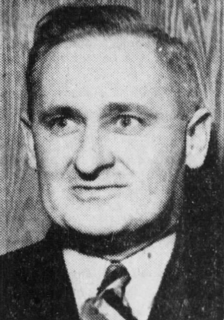
Robert Norman Dawe was a Canadian sports executive. He originated as an ice hockey referee for minor ice hockey games in Verdun, Quebec, before becoming involved in the administrative aspect of sports. He was a member of the local YMCA executive, served as secretary of the Verdun Playgrounds Commission from 1923 to 1948, and organized the Verdun Hockey Board. He served as a member of the Quebec Amateur Hockey Association (QAHA) executive committee for 23 seasons, and helped establish a provincial referee's board in 1936. In Montreal and Verdun, he was involved in girls' fastpitch softball. He served as the Montreal Ladies' Major Softball League president from 1940 to 1945, then was president of the Verdun Ladies' Softball League from 1945 to 1947. He began organizing Canadian football in 1945, when he established the Verdun Juvenile Football League and served as president.
